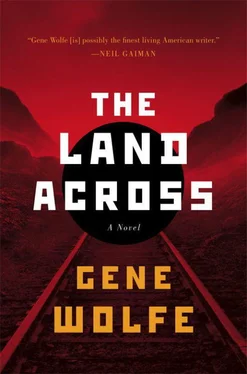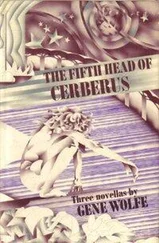While I chewed dark bread and cheese and Martya drank tea, we talked about the Willows. I described the sort of ladder I wanted—an aluminum extension ladder light enough that Martya and I could carry it. She insisted that there were no such ladders here. I wanted a steel pry bar. She wanted two of them, so she could make a cross of them. And so on.
The café fronted on the river. The fertilizer plants (if that is what they really were) were only too visible across the water, but they could have been any kind of building—castles, incinerators, prisons, public housing. You name it. Martya and I sat outside like a dozen other people, under a faded old umbrella that might have been red when it was new. European waiters despise tourists, but I was not one and felt pretty sure I did not look like one. I knew I was right when the waiter asked whether I had come to buy pork for Germany.
I told him I had not, without explaining that I was an American and a prisoner. He thanked me and said exports were raising food prices beyond the reach of the poor.
The food in his café was pretty cheap by American standards. Martya had an apple dumpling doused with syrup. I had roast duckling stuffed with mushrooms, white raisins, and apricots. There was good, hot coffee laced with malt liqueur afterward, and the two meals cost only a little more than two Americans would pay for hamburgers and soft drinks at a fast-food franchise. As I said, this café is by the river. It is called the Skiadeion.
The big screwdriver, oilcan, and pry bars I wanted (one large and one small) gave us no problems. We must have tried half a dozen stores, though, before we found flashlights. We bought two (with spare batteries, string, and more tools) even though they were smaller than I would have liked. Martya suggested candles, so we bought some, with matches and a tin lantern to hold them.
The ladder just about stumped us. We could have a little stepladder or a four-meter wooden ladder that must have weighed a hundred pounds. Another man and I might have carried one as far as the Willows, if we did not have to carry anything else. For Martya and me—already loaded with candles, lantern, flashlights, batteries, and tools … well, forget it.
No, the long and dusty shop in which we had found the big ladder did not deliver. Very reluctantly, as though he was afraid I would scoff at his suggestion, the shopkeeper confided that porters could be hired at the Mounted Guard. He was willing to hold our purchases for us upon my promise to buy his four-meter ladder if I could find men to carry it. So off we marched to the Mounted Guard.
I had imagined a sort of hiring hall in which the porters could sit while they waited for somebody to hire them. There was nothing like that, only a small ground-floor office with a window looking out onto the street. Placement was by seniority, so we got a couple of grandpas with gray mustaches. To tell the truth I was happy to get them. Some of the guys my age looked like they would cut your throat.
They followed us back to the ladder shop, inspected and approved the ladder we had decided on, and suggested we buy a stepladder, too. I said it would be all Martya and I could do to carry the tools, which were numerous and very heavy.
They insisted that we would not have to carry it. They would carry it themselves. After laying our ladder flat, they chose a stepladder for us and laid it on the rungs of the big ladder. After that, they tied our other stuff to the rails and picked the whole thing up, each resting a side rail on each shoulder. With Martya leading the way, we went back to the Willows, she and I carrying nothing at all and our porters a credit to the profession.
“Funny old place,” said one.
I explained that I was renting it and meant to get it fixed up, adding that Martya and I might live there.
The other porter spit. “A good house must got a good roof.”
I nodded.
“You trim these trees, sir. Look up there. Every little wind will drag those branches across your shingles.”
I saw he was right and told him I was planning to have the willows cut for firewood.
We got the ladders and tools inside, and I paid the porters, adding a pretty good tip. Tipping here is about the same as in America. You give a tip for good service, and keep your money for bad. Waitresses in greasy spoons think anything over ten percent is pretty nice. Waiters expect more but do not always get it from me. In the pricier places like Skiadeion, the usual tip is twenty percent for small parties and fifteen for big ones.
I was trying to take down the big brass-framed mirror I mentioned in Chapter 3 when there was a knock on the front door. Martya ran to get it and came back to tell me that somebody from the Ministry of Internal Order wanted to talk with us. I left the mirror hanging by two screws and went into the reception room with her.
I had expected him to be fat and pompous, but he was a little man with a little mustache, a bowler hat, and smart eyes. I invited him to sit down.
At that, Martya jumped in with both feet. “We cannot discuss important matters in such a place. There is a much nicer one not far from here, outside, in a garden. It will be lovely today. Let us go there.”
Naturally I said okay.
The small man asked my name, nodded, and said, “You and I have much to speak of.”
The café Martya led us to is the Haysuxia, a patio in what looks like a private house. The three of us were put at a tiny table and told that the first strawberries of the year had just arrived “from the south.” Martya consulted with the small man in their own language, asked whether I, too, would like coffee, berries, and cream (nodding as she said it), and ordered for the three of us.
“You are Amerikan,” the little man said.
I said yes and asked how he knew, hoping he would say he had seen my passport.
He shrugged. “I have heard your name, and you speak German with the accent of an Amerikan. Those suffice. It is difficult to change your Amerikan dollars here. Give some to me and I will change them for you.”
I have traveled enough to know when I am being asked for a bribe, but I was, not sure how big a bribe he wanted. I saw his eyes widen a trifle when I got out a hundred dollars. “Could you change this for me? These big bills are hard to change even in America.”
“I will try,” he said. He took it from me, held it up to the light, and put it into a tall, old-fashioned wallet with a catch.
Bowls of strawberries and cream arrived, together with cups and a carafe of good coffee.
After a cautious sip of his coffee, the small man made a steeple of his fingers. “To begin, let us dispose of the matters that brought you to my attention, sir. You have engaged the ruinous house in which I discovered you. You, or possibly another who used your name. Since I found you there, I am inclined to think it was you yourself.”
I nodded. “It was me. The official at the Mounted Guard who rented it to me knew I was foreign but made no objection.”
“That,” said the small man, “is scarcely a matter of wonder, sir. There is no law against foreigners renting, leasing, or purchasing houses here. It is entirely within the law.”
I thanked him for clarifying the point.
“There is, however, a person under citizen detention whose name is your own. Were you aware of that, sir?”
“Sure I am. I’m him.” I stirred my coffee and sipped a little to straighten up my thoughts. “As a foreigner I’m pretty unfamiliar with your law. I guess you know that.”
“I do, sir.”
“My understanding is that I have to live in the house of the citizen who’s looking after me, but that I can leave it to shop, go to clubs, see a movie or a play, or eat in cafés like we are now, as long as I go back to my host’s house at night.”
Читать дальше









